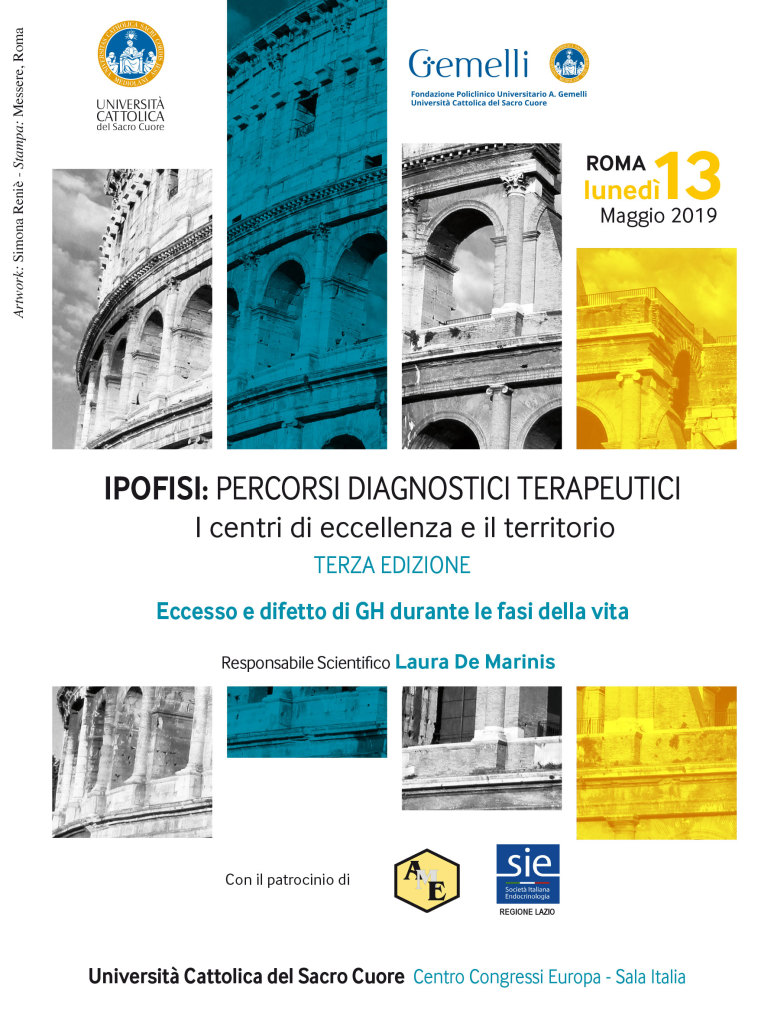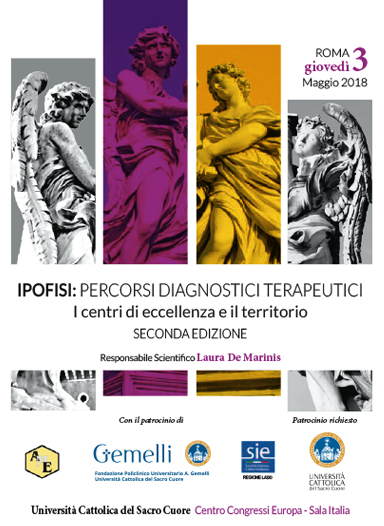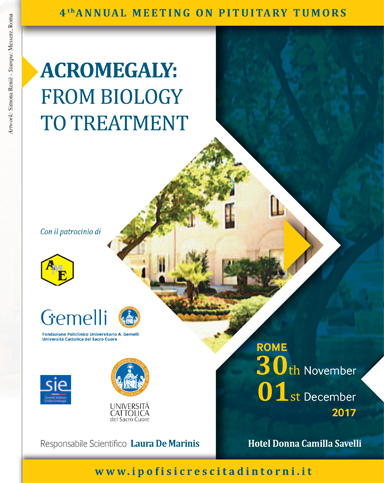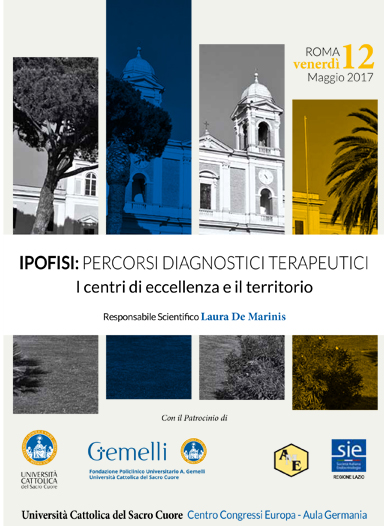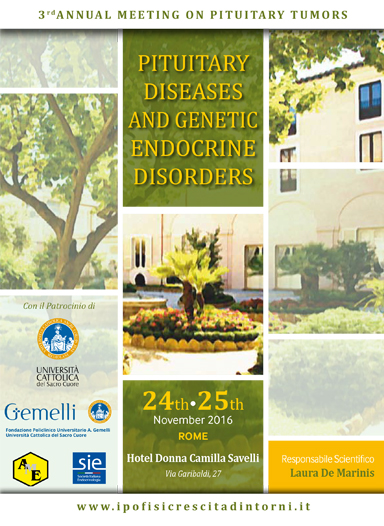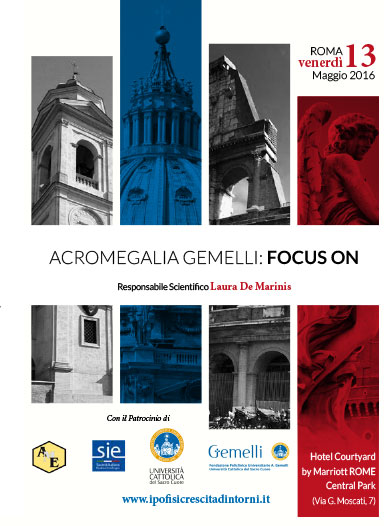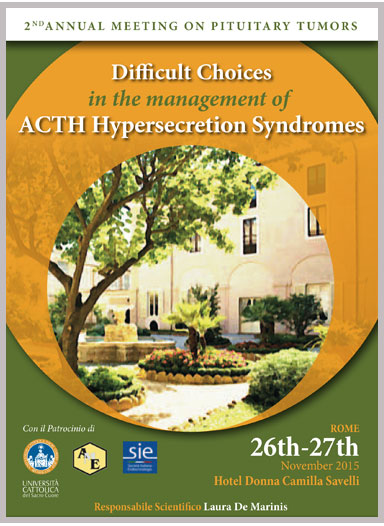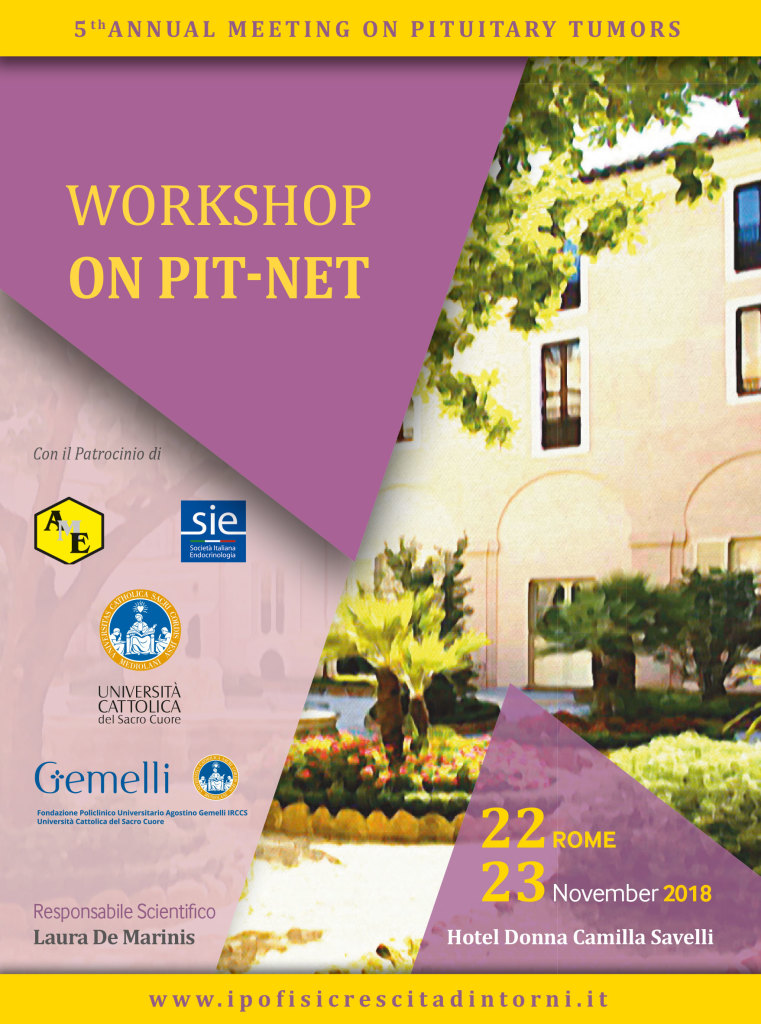
» Scarica il Programma
ROMA, 22-23 Novembre 2018
presso l’Hotel Donna Camilla Savelli
DIRETTORE
Prof. Alfredo Pontecorvi
Professore di Endocrinologia
Fondazione Policlinico Universitario A. Gemelli – Università Cattolica del Sacro Cuore, Roma
RESPONSABILE SCIENTIFICO
Prof.ssa Laura De Marinis
Responsabile UOS di Patologia Ipotalamo Ipofisaria, Policlinico Universitario A. Gemelli, Roma
SEGRETERIA SCIENTIFICA
Coordinatori:
Dott. Antonio Bianchi, Dott.ssa Antonella Giampietro
Dr. Massimiliano Andrioli, Dr.ssa Chiara Bima, Dr.ssa Sabrina Chiloiro, Dr. Giuseppe Grande, Dr. Domenico Milardi, Dr.ssa Marilda Mormando, Dr.ssa Serena Piacentini,
Dr.ssa Linda Tartaglione
UOS di Patologia Ipotalamo-Ipofisaria, Policlinico Universitario A. Gemelli, Roma
SEDE DELL’EVENTO
Hotel Donna Camilla Savelli
Via Garibaldi, 27 – Roma – Tel. 06 588861
ECM N. 680-239917
Assegnati n. 11 Crediti Formativi ECM
L’evento rientra nel piano formativo ECM 2018 della DOTCOM s.r.l. ed è rivolto alle figure professionali di Infermiere e di Medico – Chirurgo per le seguenti discipline: Anatomia Patologica, Chirurgia Generale, Endocrinologia, Gastroenterologia, Genetica Medica, Malattie Metaboliche e Diabetologia, Medicina Interna, Medicina Nucleare, Neurochirurgia, Neuroradiologia, Oftalmologia, Otorinolaringoiatria, Patologia Clinica (Laboratorio di Analisi Chimico – Cliniche e Microbiologia), Radiodiagnostica, Radioterapia
OBIETTIVO FORMATIVO
Documentazione Clinica. Percorsi Clinico-Assistenziali Diagnostici e Riabilitativi, Profili di Assistenza – Profili di Cura
PROVIDER E SEGRETERIA ORGANIZZATIVA

DOTCOM SRL
Via Flaminia, 54 | 00196 Roma
Tel. 06 4061370 | Fax 06 3242600
E-Mail: info@dotcomeventi.com
Sito web: www.dotcomeventi.com
ISCRIZIONI
Evento a numero chiuso e su invito
LINGUE UFFICIALI
Italiano/Inglese
Con il contributo non condizionante di:

Pituitary adenomas are complex and heterogeneous diseases and present multiple clinical manifestations, including a wide range of proliferative and invasive behaviors. Therefore, prediction of clinically aggressive behavior of these neoplasms, which occurs in approximately 10% of these tumors, remains debatable. The term ‘adenoma’, which defines a tumor as benign, does not seem appropriate to define aggressive and invasive pituitary tumors that cannot be resected and are refractory to therapy. For these reasons, the classification of neoplasms of adenohypophysial cells is misleading because of the simplistic distinction between adenoma and carcinoma, based solely on metastatic spread and the poor reproducibility and predictive value of the definition of atypical adenomas based on the detection of mitoses or expression of Ki-67 or p53. In addition, the current classification of neoplasms of the anterior pituitary does not accurately reflect the clinical spectrum of behavior. Invasion and regrowth of proliferative lesions and persistence of hormone hypersecretion cause significant morbidity and mortality. Therefore, recently, a reclassification of these tumors to apply terminology that has been widely accepted in other neuroendocrine tumors (NETs) was proposed. The new terminology, pituitary neuroendocrine tumor (PitNET), reflects the potential for malignant behavior of even the most bland of those neuroendocrine neoplasms and recognizes the highly variable impact of these tumors on patients. On this basis, the current event, the 1ST ANNUAL MEETING ON PITUITARY NEUROENDOCRINE TUMORS (PitNET), has the aim of updating participants on the latest biomolecular and clinical acquisitions on PitNET. The meeting is part of the teaching activities of the Master Degree in Diagnosis and Treatment of pituitary disease (2018) – Faculty of Medicine, Università Cattolica del Sacro Cuore, Rome.


